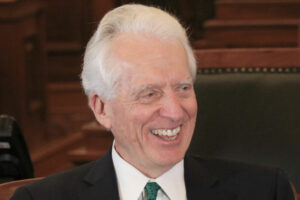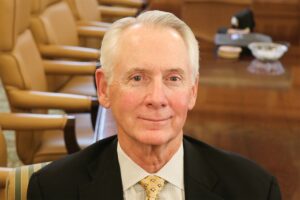Topic: Department of Social and Rehabilitation Services (SRS)

Interview of John Carlin, June 14, 2019
Interviewed by H. Edward (Ed) Flentje
This 2019 interview focuses on the experiences of John Carlin during his legislative career in the House of Representative from 1971-1978 where he led his caucus to achieve the majority party status, and his becoming only the second Democratic House speaker in the 20th Century. The interview contains anecdotes about his experiences in 4-H which he believes developed his leadership skills as well as the issues he embraced during his terms in the House. Carlin also candidly discusses the challenges he faced in working to overturn a veto of a governor of his party. Issues discussed in this interview included Show Moreprisons, the death penalty, reorganizing government, due process for teachers, court unification, centralization of the welfare system at the state level and the politics of roads and transportation. Carlin points to livestock judging as training for making decisions. Carlin believes learning to make fast, accurate decisions contributed to his political success. Show Less

Interview of James (Jim) Slattery, March 6, 2020
Interviewed by Jim McLean
The 1970's marked major changes in state government. They are doing away with county welfare offices and creating the Department of Social and Rehabilitation Services (SRS) Concerns over lack of equalization started with Caldwell school finance case. Transportation is being centralized and modernized with the creation of the Department of Transportation (KDOT). Slattery even introduced legislation to decriminalize small amount of marijuana. Campaign finance reform (post-Watergate) and hiring non-partisan, professional staff for the legislature took hold. Slattery and another new freshman, Mike Hayden support legislation to clean up strip mines and reclaim mined Show Morelands. The first income tax reform was initiated despite the governor's veto. Community corrections is emerging as a good strategy. Slattery describes the role of abortion in civil discourse in this interview, how it started in the Dole/Roy race in 1974, and how it continues to distort the American political system in a significant way. He explains why he ran for Congress as a deficit hawk and talked about some of his Congressional experiences. The interview closes with a story about Tip O'Neil and another about former Speaker Clyde Hill who advised Slattery to be accurate when speaking at the Well of the House. Show Less

Interview of George Wingert, October 28, 2022
Interviewed by David Webb
The "legendary" George Wingert served in the Kansas House from 1971-1978, but his political career spanned 50 years, five governors and countless stories. He learned early on the importance of building connections to the Republican majority and leadership and when to vote your district even if your party leader objects. Wingert was involved with higher education issues and the changes to the correctional institutions and mental health institutions and many of the other progressive issues of that period. After leaving the legislature Governor Carlin appointed him to the Kansas Board of Regents where he and fellow Show Moreregent Jordan Haines "hired and fired" a lot of people including college presidents. Then he lobbied for dog racing issues for another 15 years. The interview concludes with a couple of interesting stories about his family's involvement with national Democratic politicians. Show Less

Interview of Thomas (Tim) Owens, October 14, 2022
Interviewed by Nancy Parrish
Owens described his career path from military officer to private attorney to city council member to the state legislature. He served seven years in the Kansas House and then ran for the Kansas Senate where he chaired the Senate Judiciary Committee. Owens recounts the pressure from Governor Brownback to change the merit selection procedure for judges, making them elected. Also, the education bills were now being sent to the Judiciary committee because of lawsuits and that also caused friction because of the court's decisions on resolving the Montoy and Gannon cases. Owens also dealt with Show Morea death penalty bill which failed 20-20. He described frequent trips "across the street" carrying messages between the Chief Justice and the Governor's office. He lost his bid for reelection to the Senate in 2012 and ended up teaching at Johnson County Community College and retired from the military as a full colonel. He even served a year as municipal judge in Lenexa. Show Less

Interview of Bill Graves, December 5, 2022
Interviewed by Mike Matson
Matson's interview of Governor Graves shows the deep respect Matson has for the man he describes as "the last of the centrist, moderate Republican Kansas governors." The interview reveals the values that guided Graves throughout his 8 years in office--to whom much is given, much is expected. It shows how a well-grounded young man dealt with the news that the career for which he had prepared was no longer an option, and how he earned the respect of 73 percent of the state's voters by winning a second term for Governor. Graves talked about his three most Show Moredifficult decisions: replacing a US Senator (Dole), concealed carry and abortion restrictions. Graves concludes with a discussion of issues he thinks the Republican party should be embracing in the future. Following the interview, Matson wrote a column which summarized Bill Graves' success. It is worth reading. (Download it after the interview transcript.) Show Less

Interview of Connie Hubbell, May 21, 2025
Interviewed by Mark Tallman
Connie Hubbell is well-known in state government circles as an effective advocate for education, mental health and health care for seniors. She ran for the state board of education, winning three terms and later served as President of the National State Boards of Education organization. One of her significant accomplishments while on the Kansas state board was leading the board to mandate human sexuality AIDS education in Kansas public schools. Another was the inclusion of special education students into regular classrooms which began under her leadership of the National Association of State Boards of Education. Show MoreShe followed that experience with a run for Lt. Governor on the ticket with gubernatorial hopeful Senator Fred Kerr. Although they were not successful, three governors have subsequently noticed her management skills and offered her positions in their administrations, beginning with Governor Graves who appointed her Secretary of Aging. She has been an effective lobbyist for health care organizations, retiring as Director of Governmental Affairs for the Kansas Department for Aging and Disability Services in 2021. Show Less
